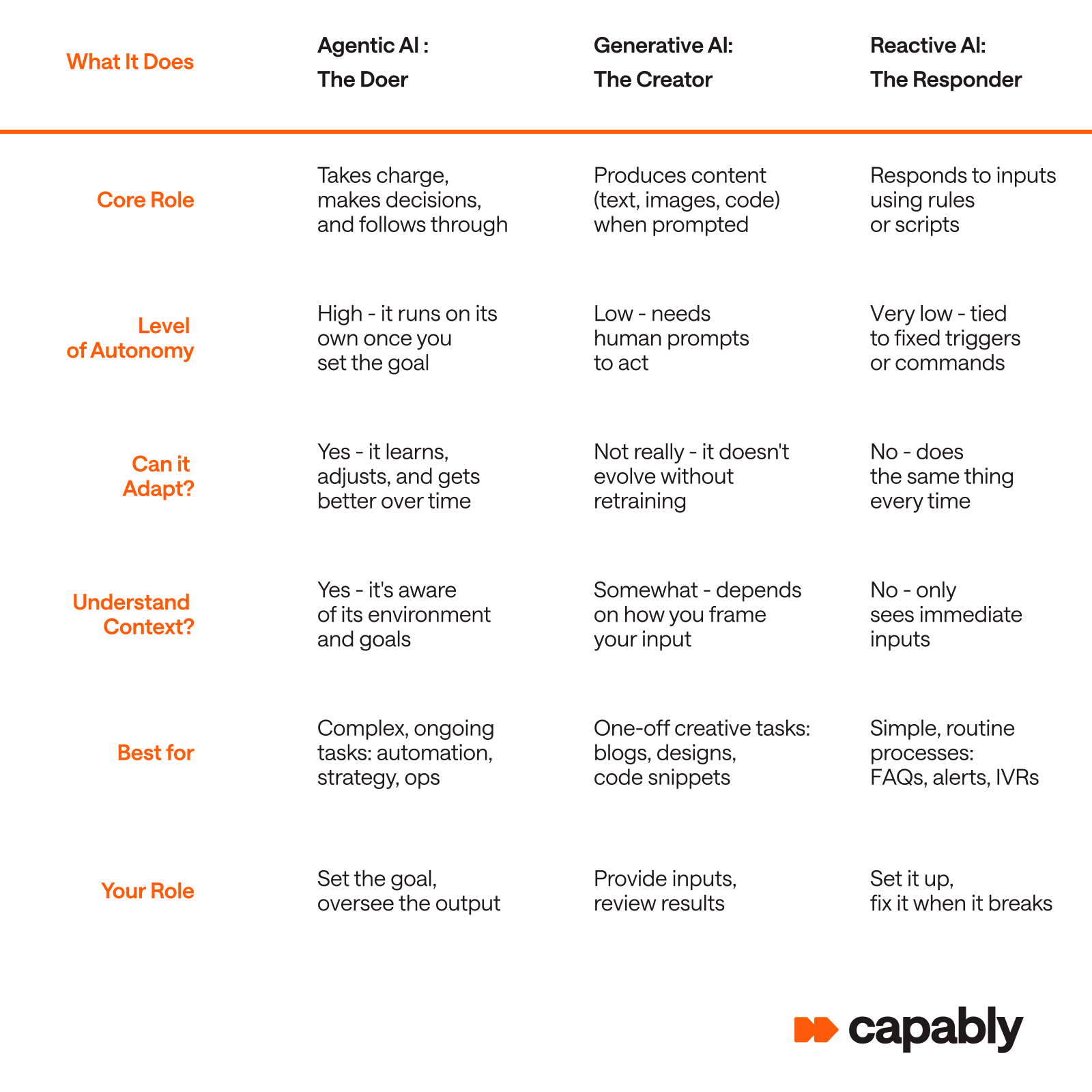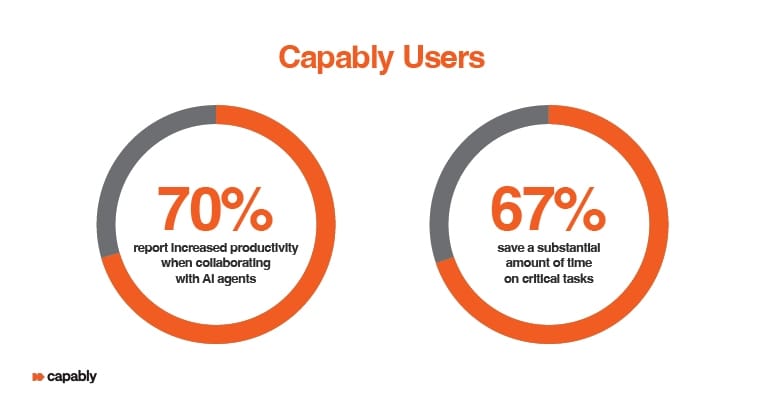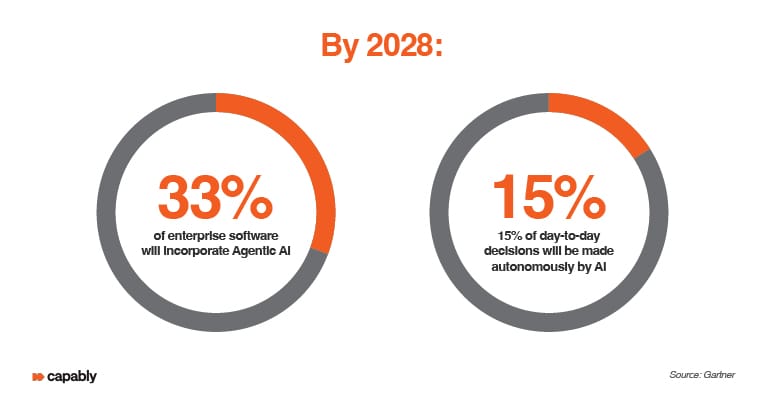Agentic AI for Beginners: Understanding Autonomous Tech

Imagine AI that doesn’t just take orders, but also initiative. From handling tasks while you sleep to adapting on the fly, Agentic AI is changing the game for businesses big and small. This beginner-friendly guide breaks it all down (no PhD required). Curious? Let’s dive in.
Imagine having a digital partner that not only follows commands but also thinks, learns, and acts on its own to drive your business forward. That is the promise of Agentic AI. Suppose you are navigating the ever-evolving landscape of artificial intelligence technology and wondering how to stay competitive without getting lost in jargon or hype. In that case, you are in the right place.
As a business leader, you are constantly looking for smarter, faster, and more scalable ways to grow. While it may sound like it, Agentic AI is not just another buzzword. It represents a pivotal shift in how automation and intelligence intersect. Unlike traditional AI, which reacts to data, Agentic systems are all about autonomous decision-making, adapting through experience, and taking meaningful action with minimal human involvement. At Capably, we like to think of it as moving from automation to genuine autonomy.
All this might sound futuristic, but it is already reshaping how businesses like yours streamline operations, enhance responsiveness, and unlock innovation across areas from enterprise management to customer service.
In this article, we will walk you through the essentials of Agentic AI: what it is, how it works, where it’s headed, and what it means for your business. Whether you are exploring ways to optimize complex, multi-step workflows or preparing for the next wave of digital transformation, this guide will help you cut through the noise and see where autonomous systems truly add value.
Let’s dive in and discover what Agentic AI can do for you.
What is Agentic AI?
Agentic AI is a form of artificial intelligence that enables systems to act autonomously, making decisions and adapting strategies without human input. It excels in dynamic environments such as business automation and space exploration, focusing on achieving specific goals through continuous self-optimization.
What really sets Agentic AI systems apart is their goal-oriented nature. These systems aren’t just running complex tasks. They are better, working toward outcomes. Whether it’s boosting customer satisfaction by analyzing user feedback or refining operations in real time, Agentic AI stays focused on the big picture while adjusting its AI strategies to deliver results. It’s like having a tireless team member who never loses sight of your business objectives.
Here are the key characteristics that make Agentic AI models especially powerful for businesses like yours:
- Autonomy: It operates independently, even within complex workflows, which means fewer manual touchpoints and more time for your team to focus on higher-value work.
- Goal-Orientation: Rather than following static rules, it adapts its approach to hit specific targets—whether that’s improving efficiency, customer retention, or service uptime.
- Adaptability: Like a smart assistant that learns your habits, Agentic AI evolves with your business, getting sharper with every interaction and decision.
- Context-Awareness: It doesn’t just process data. It understands the bigger picture. That’s critical when you’re dealing with nuanced processes like supply chain optimization, customer experience, or compliance-heavy operations.
Agentic AI also enhances collaboration, not by replacing people, but by complementing them. It enables AI assistants and humans to work together more seamlessly, with the AI handling the heavy lifting of decision-making processes and optimizations behind the scenes. The result? Smarter processes, quicker actions, and fewer bottlenecks.
As AI concepts continue to mature, the influence of Agentic AI systems will only grow. For forward-thinking businesses, now is the time to explore how these autonomous systems can become a core driver of efficiency, innovation, and long-term competitiveness.
Agentic AI vs. Other Types of AI
Suppose you’ve been hearing a lot of buzz around artificial intelligence (e.g., external tools powered by generative AI that write your marketing copy or reactive systems that power basic chatbots). In that case, it’s easy to lump everything into one category. But Agentic AI plays in a completely different league, especially when it comes to the level of ownership it can take on.
Generative AI, for example, is great at creating things. Give it a prompt, and it shows you the beauty of AI content creation: text, images, even code. It’s impressive and useful for creative tasks, but it’s inherently reactive. It needs your direction every time. It won’t make decisions, act on its own, or adapt unless you prompt it again.
Reactive AI is even more limited. Think of it like a well-trained assistant that only responds when it recognizes a specific pattern. It follows rules, executes predictable tasks, and doesn’t really understand what’s going on beyond the surface. It’s dependable for simple, repeatable workflows, but not helpful when you need flexibility or deeper thinking.
Agentic AI is different. Yes, it can (and often does) include complex elements of machine learning (ML), large language models (LLMs), neural networks, natural language processing (NLP), or natural language understanding (NLU). The difference? It’s built not just to respond, but to act. Once you give it a goal, the agentic workflow figures out the rest. It makes decisions, adjusts strategies, continuously learns from outcomes, and does the legwork in real time without constant supervision. It doesn’t just complete a task; it navigates uncertainty, shifts direction when needed, and stays aligned with your business objectives.

So if you’re exploring AI to help scale business operations, streamline complex processes, or drive smarter decision-making across your business, Agentic systems bring a level of autonomy that others, like generative AI, weren’t designed for.
Agentic AI vs. Agentic AI Automation
While closely related, Agentic AI and Agentic Automation are not interchangeable terms. They represent different layers of capability and intent.
Agentic AI, as mentioned before, refers to systems that exhibit autonomy, contextual awareness, and goal-driven behaviour. These intelligent agents can make independent decisions, learn from experience, and adapt their strategies over time.
Agentic Automation, on the other hand, is the application of that intelligence specifically to automate and orchestrate business processes. It’s where the agentic capabilities are put to work within structured workflows. They handle complex tasks, coordinate with other systems, and trigger actions across digital platforms with minimal human input.
In short, Agentic AI is the intelligence and decision-making core; Agentic Automation is how that intelligence is applied to get real work done across your business. The former makes the decisions, the latter ensures those decisions lead to action at scale.
What are Real-World Applications of Agentic AI Systems?
Agentic AI is opening up new possibilities for how organizations and systems operate. Its potential for practical applications across various industries (software development, real estate, FMCG, retail, media, finance, HR, sales etc.), complex environments, and issues is broad and compelling. Below are some key areas where agentic systems can make a real difference.
1. Business Process Automation
One way is to automate complex, multi-step workflows across any business context or industry. Take a media and advertising agency, for example. An agentic system can be designed to autonomously compile campaign performance reports by pulling in data from ad platforms, analyzing trends, and drafting commentary tailored to client KPIs. It might even assemble client proposals based on historical campaign structures, industry benchmarks, and real-time market signals. Similar AI-led automation could apply to marketing operations, customer onboarding, procurement, or internal knowledge management. In other words, any process with a clear objective and repeatable structure, but where intelligent adjustments and contextual awareness add value. It allows businesses to run more efficiently by having AI handle repetitive tasks, freeing up employees to focus on higher-value activities.
2. Personalized Healthcare Management
Agentic AI agents could streamline healthcare management and act as personal health assistants, monitoring patient vitals via connected devices, spotting irregularities, and adjusting care plans accordingly. Rather than waiting for human input, such a system could proactively recommend follow-up appointment scheduling, alter notification patterns, or surface early warning signs to medical staff. Over time, it could adapt to each patient’s specific health profile and routines, supporting more responsive and preventive care.
3. Smart Urban Infrastructure
In the context of city infrastructure, Agentic AI models have the potential to manage traffic systems that learn from real-time data. Rather than following pre-set schedules, agents could independently adjust signal timing, reroute traffic to reduce congestion, or coordinate with public transport systems based on demand patterns. The same logic could apply to energy grids, where agentic AI systems dynamically balance supply and demand, responding to fluctuations without waiting for manual oversight.
4. Disaster Response and Emergency Coordination
In high-stakes environments like natural disasters, agentic systems could serve as autonomous coordinators. They absorb data from multiple sources, such as weather reports, GPS, and sensor networks. They prioritize response actions and adjust resource allocation on the fly. These agents might help direct emergency teams more effectively or simulate the impact of different strategies in real time, all while adapting as the situation evolves.
5. Autonomous Scientific Research
In fields such as materials science and pharmaceuticals, Agentic AI’s advanced capabilities could accelerate research by automating the design and execution of experiments. A research agent could propose hypotheses, simulate outcomes, and iteratively adjust test parameters, reporting its progress back to human scientists. This could shorten discovery cycles and uncover patterns that might be missed in manual analysis—particularly in data-heavy disciplines where exploration is costly and time-consuming.
These examples point to a future where autonomous intelligence doesn’t just assist—it actively participates. While adoption at scale is still developing, the potential is already drawing interest across sectors. Understanding where these systems might fit into your own industry is the first step toward making informed, future-ready decisions. Visit our step-by-step intelligent automation guide for more information!
What are the Benefits of Agentic AI
Agentic AI isn’t just another tool, it represents a shift in how work gets done. For businesses ready to compete in a fast-moving market, it offers tangible advantages beyond traditional automation.
Increased Efficiency
By independently managing routine tasks like reporting, data handling, and basic administrative tasks, as well as complex business processes, an autonomous agent frees up your team to focus on strategic, value-driven work. But it does not stop at task execution. These systems can handle entire workflow management on the fly—adjusting schedules, reallocating resources, and keeping operations running smoothly even as conditions shift. In fact, 70% of teams using Capably report increased productivity when collaborating with AI agents, and 67% of users save a vast amount of time on critical tasks (Chesnokova, 2025).

Real-Time Decision Support
Agentic AI-driven actions are not just fast, they are informed. By pulling from live data across departments or platforms, they can suggest next steps, trigger actions, or flag risks without human prompting. These kinds of decision-making capabilities help teams act quickly and accurately, especially in high-volume or time-sensitive environments.
Built for Growth
As your business scales, so does the workload. Agentic AI can grow with demand, handling more data, more customer interactions, or more complexity without major retooling. Deployed on cloud platforms, these systems tap into scalable compute power and operate as part of a broader digital ecosystem.
Tailored to Industry Needs
Because they are goal-driven and context-aware, agentic AI tools can be adapted to fit specific industries. Whether it is building custom campaign reports in a media agency or coordinating patient care, the same intelligence can learn and act on important business patterns.
Challenges and Risks of Agentic AI
Autonomous AI systems offer significant business advantages, but they also introduce challenges that decision-makers must address. Understanding these risks and implementing proper governance ensures your organization can leverage Agentic AI safely and responsibly.
Data Security and Compliance
Agentic AI systems often process large volumes of sensitive business and customer data. This raises the risk of cyberattacks and data breaches, which can compromise customer trust and business continuity. To mitigate these risks, implement strong security measures, including encryption, strict access controls, and regular system audits. Ensuring regulatory compliance with data privacy laws is essential to protect both your organization and your customers.
Ethical Considerations and Transparency
When AI begins making decisions independently, accountability and transparency become critical. If an AI makes an error or acts on biased data, it can affect both outcomes and trust. Design systems that align with ethical standards and ensure decisions are explainable. Clear documentation and observability tools help your team understand AI decision-making and maintain credibility with stakeholders.
Oversight and Mitigating Misuse
The autonomy of Agentic AI is powerful but can also be misused if left unchecked. Risks include automating harmful actions, spreading misinformation, or making decisions outside acceptable boundaries. Establish governance protocols, including human-in-the-loop checkpoints, audit logs, and regular system reviews. Proactive monitoring ensures the AI operates within safe, responsible parameters while still maximizing efficiency.
What is the Future of Agentic AI?
The future of Agentic AI is incredibly exciting, and its impact on businesses will only continue to grow. By 2029, AI systems are expected to autonomously handle up to 80% of common customer service inquiries, reducing reliance on human intervention and driving operational costs down by as much as 30% (Gartner, Inc., 2025). This shift will allow businesses to streamline customer relationship management while focusing human resources on higher-value tasks that require creativity and strategic input.
The move towards AI-based automation is happening quickly. In fact, 70% of business leaders are confident that AI will soon replace traditional robotic process automation (RPA) (SS&C | Blue Prism, 2025). This transition will allow companies to scale their operations more efficiently and improve business operations through more sophisticated and adaptable intelligent systems.
Many employees believe that adopting AI-powered workflows will improve their work‑life balance. In fact, a recent study shows this number to be as high as 71 % (AllWork.Space, 2025). A quarter of business leaders even expect AI-powered automation to enable a four‑day workweek, showing how intelligent systems may reshape both work and wellness (Blue Prism, 2025).

Looking ahead, the landscape is evolving fast. By 2028, it is projected that agentic AI will be built into about one‑third (33 %) of enterprise software applications, making it a central part of how businesses operate (Gartner, 2024). Gartner also predicts that roughly 15 % of day‑to‑day decisions will be handled autonomously by agentic systems, reshaping how strategies and processes unfold (Gartner, 2024). In digital commerce, research suggests that AI agents could manage around 20 % of interactions in online stores by 2028, reflecting how customer engagement is shifting toward intelligent systems (Telekom, 2025)
The key to this future will be continuous monitoring, reinforcement learning, and feedback loops. As Agentic AI evolves, it will operate more like a multi-agent system, where interconnected agents collaborate to make informed decisions with minimal human input. From supply chain management to virtual assistants, these systems will redefine efficiency, delivering insights and decisions faster than ever before. By embracing these technologies now, businesses can position themselves for long-term success in an increasingly automated world.
Conclusion
In conclusion, Agentic AI is not just the next big thing. It is the future of how businesses will operate. Moreover, if you are leading a small or medium-sized business, now is the perfect time to start exploring what these AI systems can do for you. We are talking about autonomous decision-making that takes routine tasks off your plate, boosts customer experience, and analyzes data in real time without any human intervention.
Imagine that kind of freedom!
From streamlining your supply chain management to refining complex workflows, Agentic AI is not just a tool; it is a partner. With reinforcement learning and feedback loops that allow systems to improve continuously, it is like having an employee who never needs to sleep, becoming more innovative and efficient over time. As tech keeps evolving, your business can keep adapting and staying ahead of the competition.
FAQs
How does agentic AI combine multiple AI methods to act autonomously?
It orchestrates machine learning, reinforcement learning, NLP, memory systems, and tool integration (e.g., APIs) into a single pipeline. This allows it to unpack goals into sub‑tasks, strategize, act, reflect on outcomes, and adapt over time.
Can agentic AI integrate with existing enterprise systems?
Yes, agentic AI often connects with CRMs, ERPs, databases, and communication tools. Once integrated, it can coordinate end‑to‑end business workflows, such as lead routing and inventory management, without requiring new infrastructure.
What industries are currently benefiting from agentic AI?
It is gaining traction across sectors, including supply chain, real estate, healthcare, FMCG, marketing, cybersecurity, financial services, and customer support. Notable use cases include predictive maintenance, autonomous marketing campaigns, patient triage, and complex business process automation.
What are the main risks and required safeguards?
Agentic systems can raise concerns around privacy, safety, accountability, bias, and security. They may require deep enterprise data access, increasing vulnerability. Mitigation strategies include policy controls, audit logs, human-in-the-loop checkpoints, and alignment frameworks to manage behavior and responsibility.
How do you ensure agentic AI remains aligned with business goals and ethics?
Best practices advise setting clear objectives. They also suggest adding guardrails, such as policy analytics or constitutional layers, such as “superego” models. You should continuously monitor performance using observability tools to detect drift, bias, or unintended behaviors.
How will agentic AI evolve in the next few years?
Expect broader enterprise AI usage, the rise of a digital workforce built around agent-led hybrid systems, and new regulatory/governance standards across trust, safety, and alignment. Frameworks from Gartner, IEEE, EU law, and specialized research are already emerging to support responsible deployment.